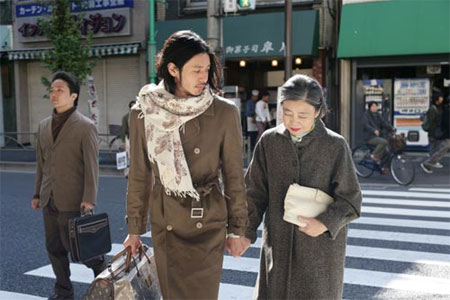|
|
|
|
|
|
|
|
Tokyo Tower: Mom & Me,
and Sometimes Dad |
|
|
|

Joe Odagiri (left) and Kirin Kiki (right) in Tokyo Tower |
|
| |
Japanese: |
Tawa - Okan to Boku to, Toki Toki, Oton |
|
|
Year: |
2007 |
|
|
|
Director: |
Joji Matsuoka |
|
|
|
Writer: |
Suzuki Matsuo |
|
|
| |
Cast: |
Joe Odagiri, Kirin Kiki, Yayako Uchida, Takako Matsu, Kaoru Kobayashi, Hiroyuki Hirayama, Yoshiyoshi Arakawa, Tamae Ando, Akira Emoto, Junko Emoto |
|
| |
The
Skinny: |
This oft-adapted tearjerker does have a few surprises. However, it's mostly a solid, well-told, and well-acted story about a hardworking mother and her sometimes-deadbeat son. |
|
|
Review
by
Kevin Ma: |
Tokyo Tower: Mom & Me, and Sometimes Dad is a bit of a surprise right out of the gate. The third adaptation of the popular novel within a year (after the television movie and television series by Fuji), this tearjerker about a dying mother and her son could've been written by a standard television writer. However, the producers picked actor/director Suzuki Matsuo as its writer instead, even though he's more known behind-the-scenes for his writing/directing debut, the eccentric and maniacal comedy Koi No Mon. Furthermore, instead of going with a more traditional-looking idol for its leading man, the filmmakers chose Joe Odagiri, whose cool exterior (including that jungle hair) doesn't usually make him the first choice for family melodramas. Most surprising of all is the fact that Tokyo Tower manages to subvert expectations by doing more than just go through the motions of an Asian terminal illness film.
The story is well-known by now: based on an auto-biographical novel by Renaissance man Lili Franky, Tokyo Tower tells the story of Masaya (Joe Odagiri) and his mother Eiko (played by two actresses, more on that later). The film opens on the inevitable: Eiko has already been admitted to the hospital, while Masaya balances spending time with his mother and working at multiple jobs, including one as a perverted radio personality. Meanwhile, the film flashes back to Masaya's childhood, when his mother moved them back to her hometown to get away from his deadbeat dad, who eventually does have a minor presence in his life.
Tired of the countryside, Masaya moves to Tokyo to go to art school, but ends up spending his mother's money to take on some of his father's worst habits. Eiko works even harder to support her son, while he gradually gets deeper into debt. However, by the time he gets back on his feet, his mother has been diagnosed with cancer. Looking for a chance to finally take care of his mother, he asks her to live with him in Tokyo, where she will spend the rest of her days. Believe me, it's not really a spoiler.
Director Joji Matsuoka tones the illness part of the story down considerably, concentrating on Masaya's somewhat fractured relationship with his parents, despite the fact that the flashbacks revolve around Eiko's last moments. Nevertheless, he sticks to the biographical style of the novel by retaining a subdued tone throughout most of the film, only driving up the emotions when the moment calls for it and rarely sensationalizing them. The director's work here is mostly invisible, with very few flashes of directorial showmanship. Meanwhile, Tokyo Tower may be a sobering film about terminal illness and familial relationships, but Matsuo's sometimes-off-putting sense of humor, which sometimes shows up at the oddest moments, adds an amusing edge that may not always be appropriate, but is still strangely effective.
The actors still go through it all with a straight face, especially Joe Odagiri. He turns in a low-key performance that carries a seemingly natural likeability instead of Odagiri's usual cool, making his Masaya an easy character to root for. With less to do, but still excellent are real-life daughter and mother Yayako Uchida and Kirin Kiki playing young and old Eiko, respectively. While Kirin has to do most of the heavy lifting, depicting the cancer-stricken stage of Eiko's life, Uchida holds her own as the young Eiko. On the other hand, Takako Matsu is given a thankless role as Masaya's girlfriend, a vastly underwritten role that seems penciled in to include the obligatory love interest. However, the lack of interest in the character has more to do with the filmmakers trying to fit everything in 140 minutes than Matsu's acting abilities.
While some may not find the film very touching, Matsuoka handles the material in a relatively naturalistic fashion. There are only a handful of moments that can be deemed "emotionally manipulative", but one can't expect a film like Tokyo Tower to completely give up on affecting its audience anyway. Love for family is one of the most basic emotions, and these filmmakers are certainly not the first people to use it to their advantage (remember: third adaptation within a year.). On the other hand, Matsuo's screenplay doesn't always use the age-old tricks to tell its story, which breathes a hint of fresh air into a classic (and nearly stale) genre formula. As a film that balances old-fashioned storytelling with unusual humor, Tokyo Tower deserves more than its "just another adaptation" label. It may not be the most touching version of the story, but if you at least feel the impulse to pick up the phone and call your mother after watching it, then it was successful enough. (Kevin Ma 2008) |
|
|
Availability: |
DVD (Hong Kong)
Region 3 NTSC
Edko Films Ltd. (HK)
16x9 Anamorphic Widescreen
Japanese Language Track
Dolby Digital 5.1 / DTS
Removable English and Chinese Subtitles |
|
|
|
 |
|
|
|
image courtesy of http://www.pia.co.jp/ |
|
|
|
|
|
|
|
|
|
|
|
| LoveHKFilm.com
Copyright ©2002-2017 Ross Chen
|
|
|